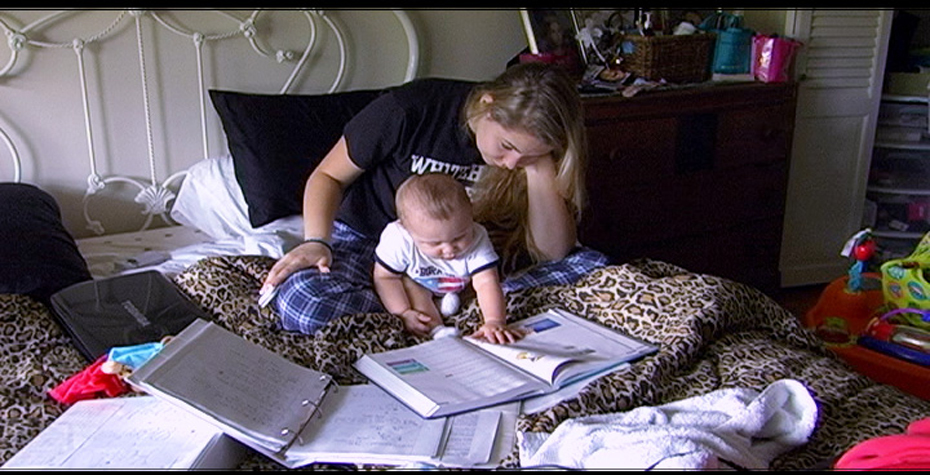New Study Finds MTV’s '16 & Pregnant' and 'Teen Mom' Contributed to Record Decline in U.S. Teen Childbearing Rate

MTV's 16 and Pregnant and Teen Mom have had an impact on teen birth rates—but not in the way critics of the shows originally thought they might. Rather than glamorizing teen pregnancy, a new study by Phillip B. Levine, Wellesley's Katharine Coman and A. Barton Hepburn Professor of Economics, and Melissa Schettini Kearney of the University of Maryland, shows that the MTV series have played a large role in significantly reducing births to teens.
Their study, “Media Influences on Social Outcomes: The Impact of MTV’s 16 and Pregnant on Teen Childbearing,” published today by The National Bureau of Economic Research, found that MTV’s 16 and Pregnant and Teen Mom led to a 5.7 percent reduction in teen births, accounting for around one-third of the overall decline in teen births in the year and a half following the show’s introduction in 2009.
“In some circles, the idea that teenagers respond to media content is a foregone conclusion, but determining whether the media images themselves cause the behavior is a very difficult empirical task,” said Kearney. To determine the show’s impact on teens, Kearney and Levine analyzed several measures of exposure, including Nielsen ratings data and metrics from Google and Twitter and then the impact on teen birth rates using Vital Statistics Natality microdata.
Both 16 and Pregnant and Teen Mom have a large and highly engaged following, win ratings wars, and lead teens to search for and tweet about the themes within. Levine and Kearney found that searches and tweets about birth control and abortion spike exactly when the show is on and in locations where it is more popular.
“Our use of data from Google Trends and Twitter enable us to provide some gauge of what viewers are thinking about when they watch the show,” Levine said. “We conclude that exposure to 16 and Pregnant and Teen Mom was high and that it had an influence on teens’ thinking regarding birth control and abortion.”
Their most important finding is that “the introduction of 16 and Pregnant along with its partner shows, Teen Mom and Teen Mom 2, led teens to noticeably reduce the rate at which they give birth,” according to Kearney and Levine. They estimate that these shows “led to a 5.7 percent reduction in teen births that would have been conceived between June 2009, when the show began, and the end of 2010. This can explain around one-third of the total decline in teen births over that period.” Although data limitations precluded Kearney and Levine from conducting separate analyses of abortions, the researchers note that teen abortion rates also fell during this period—suggesting that the shows’ impact is likely attributable to a reduction in pregnancy rather than greater use of abortion.
According to the authors, the finding that 16 and Pregnant and Teen Mom had an impact suggests that MTV drew in teens who actually were at risk of teen childbearing and conveyed to them information that led them to change their behavior, preventing them from giving birth at such a young age.
“When we developed 16 and Pregnant, teen birth rates were reported to be on the rise, so we created this series as a cautionary tale on the hard realities of teen pregnancy. We are deeply grateful to the National Campaign to Prevent Teen and Unplanned Pregnancy for their expert guidance,” said Stephen Friedman, President of MTV. “We've always believed that storytelling can be a powerful catalyst for change, and are incredibly heartened by this news.”
“The fact that MTV knows how to make shows that teens like to watch, which speak to them in ways that resonate, presumably is critical to the show’s impact,” Kearney and Levine said.
Sarah Brown, CEO of The National Campaign to Prevent Teen and Unplanned Pregnancy called the historic decline in teen pregnancy “one of the nation’s great success stories of the past two decades.” Brown said, “MTV and other media outlets have undoubtedly increased attention to the risks and reality of teen pregnancy and parenthood and, as this research shows, have likely played a role in the nation’s remarkable progress.”
The New York Times covered the study today in an article titled MTV's 16 and Pregnant, Derided by Some, May Resonate as a Cautionary Tale. For additional information, read the study press release or visit: www.wellesley.edu/teenmomstudy.
